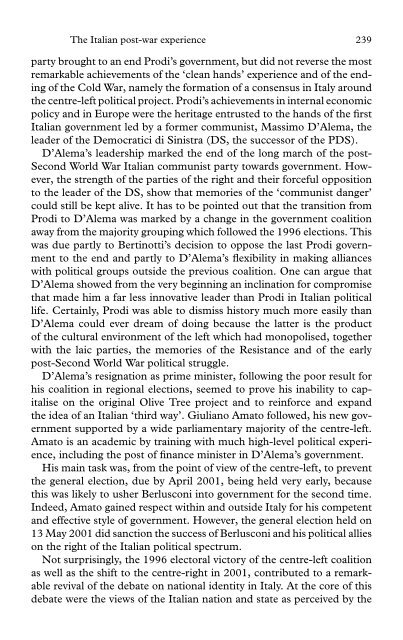Memory and Power in Post-War Europe: Studies in the Presence of ...
Memory and Power in Post-War Europe: Studies in the Presence of ...
Memory and Power in Post-War Europe: Studies in the Presence of ...
You also want an ePaper? Increase the reach of your titles
YUMPU automatically turns print PDFs into web optimized ePapers that Google loves.
The Italian post-war experience 239<br />
party brought to an end Prodi’s government, but did not reverse <strong>the</strong> most<br />
remarkable achievements <strong>of</strong> <strong>the</strong> ‘clean h<strong>and</strong>s’ experience <strong>and</strong> <strong>of</strong> <strong>the</strong> end<strong>in</strong>g<br />
<strong>of</strong> <strong>the</strong> Cold <strong>War</strong>, namely <strong>the</strong> formation <strong>of</strong> a consensus <strong>in</strong> Italy around<br />
<strong>the</strong> centre-left political project. Prodi’s achievements <strong>in</strong> <strong>in</strong>ternal economic<br />
policy <strong>and</strong> <strong>in</strong> <strong>Europe</strong> were <strong>the</strong> heritage entrusted to <strong>the</strong> h<strong>and</strong>s <strong>of</strong> <strong>the</strong> first<br />
Italian government led by a former communist, Massimo D’Alema, <strong>the</strong><br />
leader <strong>of</strong> <strong>the</strong> Democratici di S<strong>in</strong>istra (DS, <strong>the</strong> successor <strong>of</strong> <strong>the</strong> PDS).<br />
D’Alema’s leadership marked <strong>the</strong> end <strong>of</strong> <strong>the</strong> long march <strong>of</strong> <strong>the</strong> post-<br />
Second World <strong>War</strong> Italian communist party towards government. However,<br />
<strong>the</strong> strength <strong>of</strong> <strong>the</strong> parties <strong>of</strong> <strong>the</strong> right <strong>and</strong> <strong>the</strong>ir forceful opposition<br />
to <strong>the</strong> leader <strong>of</strong> <strong>the</strong> DS, show that memories <strong>of</strong> <strong>the</strong> ‘communist danger’<br />
could still be kept alive. It has to be po<strong>in</strong>ted out that <strong>the</strong> transition from<br />
Prodi to D’Alema was marked by a change <strong>in</strong> <strong>the</strong> government coalition<br />
away from <strong>the</strong> majority group<strong>in</strong>g which followed <strong>the</strong> 1996 elections. This<br />
was due partly to Bert<strong>in</strong>otti’s decision to oppose <strong>the</strong> last Prodi government<br />
to <strong>the</strong> end <strong>and</strong> partly to D’Alema’s flexibility <strong>in</strong> mak<strong>in</strong>g alliances<br />
with political groups outside <strong>the</strong> previous coalition. One can argue that<br />
D’Alema showed from <strong>the</strong> very beg<strong>in</strong>n<strong>in</strong>g an <strong>in</strong>cl<strong>in</strong>ation for compromise<br />
that made him a far less <strong>in</strong>novative leader than Prodi <strong>in</strong> Italian political<br />
life. Certa<strong>in</strong>ly, Prodi was able to dismiss history much more easily than<br />
D’Alema could ever dream <strong>of</strong> do<strong>in</strong>g because <strong>the</strong> latter is <strong>the</strong> product<br />
<strong>of</strong> <strong>the</strong> cultural environment <strong>of</strong> <strong>the</strong> left which had monopolised, toge<strong>the</strong>r<br />
with <strong>the</strong> laic parties, <strong>the</strong> memories <strong>of</strong> <strong>the</strong> Resistance <strong>and</strong> <strong>of</strong> <strong>the</strong> early<br />
post-Second World <strong>War</strong> political struggle.<br />
D’Alema’s resignation as prime m<strong>in</strong>ister, follow<strong>in</strong>g <strong>the</strong> poor result for<br />
his coalition <strong>in</strong> regional elections, seemed to prove his <strong>in</strong>ability to capitalise<br />
on <strong>the</strong> orig<strong>in</strong>al Olive Tree project <strong>and</strong> to re<strong>in</strong>force <strong>and</strong> exp<strong>and</strong><br />
<strong>the</strong> idea <strong>of</strong> an Italian ‘third way’. Giuliano Amato followed, his new government<br />
supported by a wide parliamentary majority <strong>of</strong> <strong>the</strong> centre-left.<br />
Amato is an academic by tra<strong>in</strong><strong>in</strong>g with much high-level political experience,<br />
<strong>in</strong>clud<strong>in</strong>g <strong>the</strong> post <strong>of</strong> f<strong>in</strong>ance m<strong>in</strong>ister <strong>in</strong> D’Alema’s government.<br />
His ma<strong>in</strong> task was, from <strong>the</strong> po<strong>in</strong>t <strong>of</strong> view <strong>of</strong> <strong>the</strong> centre-left, to prevent<br />
<strong>the</strong> general election, due by April 2001, be<strong>in</strong>g held very early, because<br />
this was likely to usher Berlusconi <strong>in</strong>to government for <strong>the</strong> second time.<br />
Indeed, Amato ga<strong>in</strong>ed respect with<strong>in</strong> <strong>and</strong> outside Italy for his competent<br />
<strong>and</strong> effective style <strong>of</strong> government. However, <strong>the</strong> general election held on<br />
13 May 2001 did sanction <strong>the</strong> success <strong>of</strong> Berlusconi <strong>and</strong> his political allies<br />
on <strong>the</strong> right <strong>of</strong> <strong>the</strong> Italian political spectrum.<br />
Not surpris<strong>in</strong>gly, <strong>the</strong> 1996 electoral victory <strong>of</strong> <strong>the</strong> centre-left coalition<br />
as well as <strong>the</strong> shift to <strong>the</strong> centre-right <strong>in</strong> 2001, contributed to a remarkable<br />
revival <strong>of</strong> <strong>the</strong> debate on national identity <strong>in</strong> Italy. At <strong>the</strong> core <strong>of</strong> this<br />
debate were <strong>the</strong> views <strong>of</strong> <strong>the</strong> Italian nation <strong>and</strong> state as perceived by <strong>the</strong>
















